KANDAHAR – The need for dialogue and shared decision-making between elected officials and communities was a subject of discussion at a recent UN-backed televised debate in Kandahar province.
In a lively debate, panelists, consisting of members from civil society, the provincial council and peace committees stressed the importance of dialogue, engagement and shared decision making between elected officials and citizens to foster not only peace but sustainable development in the region.
“Elected officials can use their influence and open channels of dialogue with communities through tribal elders and community representatives said Mr. Naser Mubariz, a member of the civil society in Kandahar and a panelist.
For Athaullah Ata, a member of the Kandahar provincial council, dialogue is already taking place and the council actively engaging and reaching out to communities on peace processes and other programs. “We have extended our outreach to all districts that are relatively safe and together we are working on building peace,” he said.
Kandahar, a mountainous and rural province, shares a long rugged border with Pakistan to the south and east. The restive region, is also known for its agricultural products, in particular pomegranates and grapes.
The television programme was part of a 15-part series on the role of youth in peace, supported by the Kandahar regional office of the UN Assistance Mission in Afghanistan (UNAMA) in partnership with Hewad TV. Each programme reaches an estimated audience of 400,000.
UNAMA has been partnering with local media in the eastern region and other parts of the country to create platforms using radio, social media and television for communities to engage and discuss issues affecting them.
UNAMA is mandated to support the Afghan Government and the people of Afghanistan as a political mission that provides 'good offices' among other key services. 'Good offices' are diplomatic steps that the UN takes publicly and in private, drawing on its independence, impartiality and integrity, to prevent international disputes from arising, escalating or spreading.
UNAMA also promotes coherent development support by the international community; assists the process of peace and reconciliation; monitors and promotes human rights and the protection of civilians in armed conflict; promotes good governance; and encourages regional cooperation.






